Jiyoon Han (MBA 2021) is getting a taste of what it’s like to be a case protagonist—learning how to pivot while measuring unforeseen challenges against new opportunities. When news broke in March about how COVID-19 would affect the Harvard Business School (HBS) campus community, Han decided to return home to Queens, NY, to both complete her first-year MBA studies online, and launch an e-commerce site to help her parents’ small business, Bean&Bean Coffee Roasters, stay afloat.
“It’s been surreal. This morning, I had a Finance class on a mining company in Africa, followed by a Business, Government, and the International Economy class on the monetary crisis in Argentina, and then I roasted coffee beans and worked on the site in the afternoon,” recalls Han about a recent Tuesday. While she misses her sectionmates and in-person discussions with professors, she looks on the bright side. “It’s been a challenge that I am enjoying and learning so much from every day.”
Han explains that her parents, Rachel and Richard Han, were early franchisees of Wendy’s in South Korea in the 1990s and learned to thrive in the fast-food, fast-casual restaurant space. The family, which includes brother, Jacob, immigrated to Queens in 2000. They later established Bean&Bean, located in Manhattan near the Wall Street subway station, right before the financial crisis hit in 2008.
The family eventually grew the company to four locations in Greater New York, three of which are now shuttered. The Hans have had to lay off employees and understand that the closures have a ripple effect along their supply chain. “COVID-19 is the second big storm we’ve had to weather,” Han says. “There’s immense pressure on everyone from the employees to the coffee producers we’re buying from because their livelihoods depend on our ability to sell coffee.”
Not long after returning home as HBS classes are now virtual, Han decided to create an e-commerce site for Bean&Bean, drawing on her pre-HBS career in software development and user-experience design. “The e-commerce storefront was an absolute necessity. It’s almost like survival or death,” she says. “Because my parents are not tech-savvy, this is where I’m able to help.”
The ethically-sourced specialty beans the company offers are from farms and cooperatives in Guatemala, Costa Rica, Mexico, Jamaica, Ethiopia, Tanzania, Indonesia, and Hawaii, where the Hans have forged strong ties with bean producers. In January both mother and daughter visited nearly 20 farms in Latin America where, in addition to seeing how the sites operate, they sampled the wares. After graduating from Columbia University, Han trained to be a certified Q Arabica Grader (“coffee sommelier”) with her mother, cupping coffees to discern the tasting notes and quality that help them assign grades to the beans. The green coffee beans they select are shipped to Queens where, Han says, “Any coffee that you buy from us online right now is roasted by me.” She explains that having a roaster on site and only serving organic coffee are what differentiated Bean&Bean from the many other coffee shops in New York when her family launched the company 12 years ago.
While Han knows how to juggle her HBS caseload with bean roasting and site development, she freely admits that she needs help reaching existing Bean&Bean customers and attracting new ones. For counsel, she turned to Sarah Endline (MBA 2001), an Entrepreneur-in-Residence at the Harvard Innovation Lab (i-lab) and former CEO of sweetriot, a socially-conscious purveyor of organic dark chocolate from Latin America.
“How do we reach those customers that have been coming to our shops for 12 years? I’m still trying to navigate that, which is where Sarah has been incredibly helpful,” says Han. Through HBS’s Rock Center for Entrepreneurship, she first drew on Endline’s expertise in the fall to talk about developing her own startup, Pepperpot Tea Company, as a participant in the i-lab’s Venture Incubation Program. Han reached out to Endline again for guidance after launching Bean&Bean’s e-commerce site, and their Zoom mentoring sessions have become weekly occurrences.
“I’m definitely tapping into my own retail experience to help Jiyoon,” says Endline. “What I have said to her is, now that you’ve launched the site, you need to build the community and think about how you are talking to your customers. Get into the mindset of the consumers: who are they, where do they shop, and where do they work, live, and play?”
Han notes that she already has some customer information collected through Square, the digital payment system Bean&Bean has used in its shops. Endline is helping her understand how to leverage its metrics dashboard and develop communications through which Han can share her story in an authentic way that resonates with customers.
“Jiyoon is an incredible self-starter, deeply loyal to her family, and amazingly hands on. I'm inspired by her,” says Endline. “I think coming home from HBS, doing her regular schoolwork, and creating an e-commerce site to help save the family business is a testament to Jiyoon’s loyalty and to her being an entrepreneur-at-heart.”
In response to COVID-19, the NYC coffee community and Oatly USA, the oat drink company, recently launched www.nylovescoffee.com, a coffee retail site that enables people to send cups of coffee directly to NYC essential workers and support the NYC Barista Relief Fund to help baristas who have lost their jobs.
This story was originally posted on the HBS Newsroom website.

